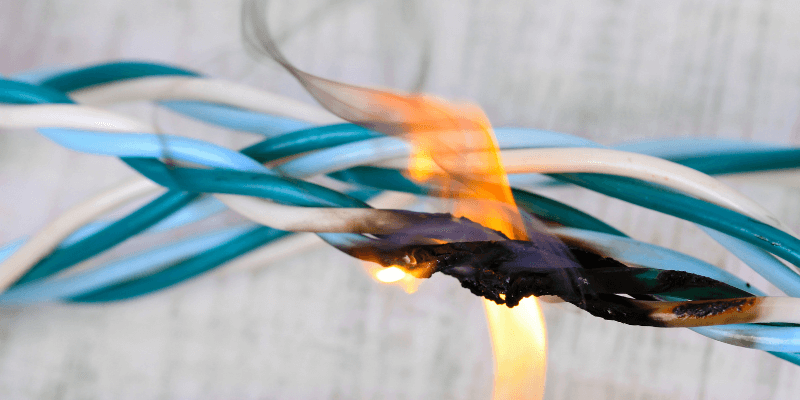The short circuit is one of the most potentially dangerous household accidents. It can damage the system, cause electric shocks, even cause explosions and fires. It is therefore essential to adopt a series of preventive measures and fully comply with current legislation in terms of safety.
The result of a short circuit can be appliance damage, electrical shock, or even a fire. And if you’re not taking any preventative measures against short circuits, you’re only increasing the risk of these situations happening. Hays NYC advises every handyman homeowner to practice ways to prevent short circuits, and we have listed 5 of these steps below.

What is Short Circuit? Why does it happen?
The short circuit happens due to a fault in the electrical system.
Generally, it occurs as a result of contact between the phase and neutral wires, generating a passage of strong intensity of the current and damaging the circuit. It generates heat which in turn causes sparks, damaging the system and the connected devices. Even worse, it can lead to more serious consequences in the form of a fire breakout.
What are the Signs of a Short Circuit?
The Breaker Does Not Reset:
When a circuit breaker trip, reset it to restore power to the circuit. If you reset it and it clicks again, it means there is a dangerous amount of electricity moving through it. In cases like this, the switch may not be the source of the problem. On the other hand, you may not be able to reset the switch. If the switch does not allow you to put it back into place after moving it to the “off” position, you may have an invalid circuit breaker.
Flickering Lights:
Blinking lights are a nuisance no matter what the cause, but if you notice the problem in specific parts of your home, it could be a short circuit interruption problem. This is even more likely if the lights blink or blink when using certain devices. A bad circuit could be at the root of the problem, but don’t make the mistake of thinking a quick fix can fix it. If there is a visible problem, there may be more under the surface! A professional can perform a thorough inspection and find out something else may be wrong.
Humming Sound Coming From the Switch Panel:
If you notice a buzz in the panel, there may be a connection problem. There may also be an overloaded breaker that hasn’t tripped, which can be a serious problem. If you hear a hum coming from the switch panel, don’t risk leaving it alone in the hope that it will resolve itself. Call an expert as soon as possible before a more serious problem has a chance to develop.
If you’re noticing these signs of circuit breaker issues, a professional can help you get back on track quickly and safely. Don’t risk trying to handle problems on your own.
How to Prevent Short Circuit in Your Home
Using Power Strips:
Do not overload electrical sockets by using reducers or double plugs: they bring together several electronic devices on a single socket. This can cause the conductors to overheat and cause a short circuit. It is good practice to use power strips instead of multiple plugs.
Checking all Appliances:
Check if all appliances connected to the system show signs of wear. The cables and wires may have “grounded” and cause a short circuit in the electrical system. Make sure to check your appliances periodically checked by specialists.
Also, remember to unplug the appliance from the socket when you are about to carry out cleaning. This is because the liquid substances used for cleaning can reach the plug and cause a short circuit in the house.
Practicing Safety in Bad Weather:
A short circuit is not uncommon when there is bad weather, especially if you are witnessing intense lightning storms. In these situations, it is better to minimize the consumption of electricity by turning off the connected devices. This step can help minimize the harmful effects in the event of a system overvoltage.
Performing a Periodic Maintenance:
Make sure to get your electrical system checked every 2-3 years. An electrician checks sockets, cables, and other appliances to detect the danger of a short circuit. If you notice some bare wires, it is necessary to replace them, as there is a high risk of short circuit, as well as representing a danger for all the tenants of the house.
Checking the Appliances before Use:
Just like sockets, we recommend that you also check your appliances before plugging them in. Short circuits can also be caused by faulty wiring or circuitry from the appliance itself. Before each use, check the appliances for these signs:
- Damaged cables, casing, or wire.
- Several cracks in the appliance.
- The equipment has exposed circuitry.
Miscellaneous Short Circuit Prevention Tips
To prevent short circuits in the home and to protect everyone’s health, follow these additional simple tips:
- Never touch sockets and switches with wet hands.
- When you go to sleep in the evening, unplug the TV and other appliances.
- For long absences from home, turn off the main power switch.
- Never touch plugs and switches with bare feet.
- Short circuit at home: photos and images
If you would like to better maintain your circuit breakers using professional services, contact Hays NYC for our circuit breaker services. Do what’s best for your electrical system by practicing these ways to prevent short circuits. Give us a call at 212-222-2770 to speak with Hays NYC leading electrical experts.






0 Comments.